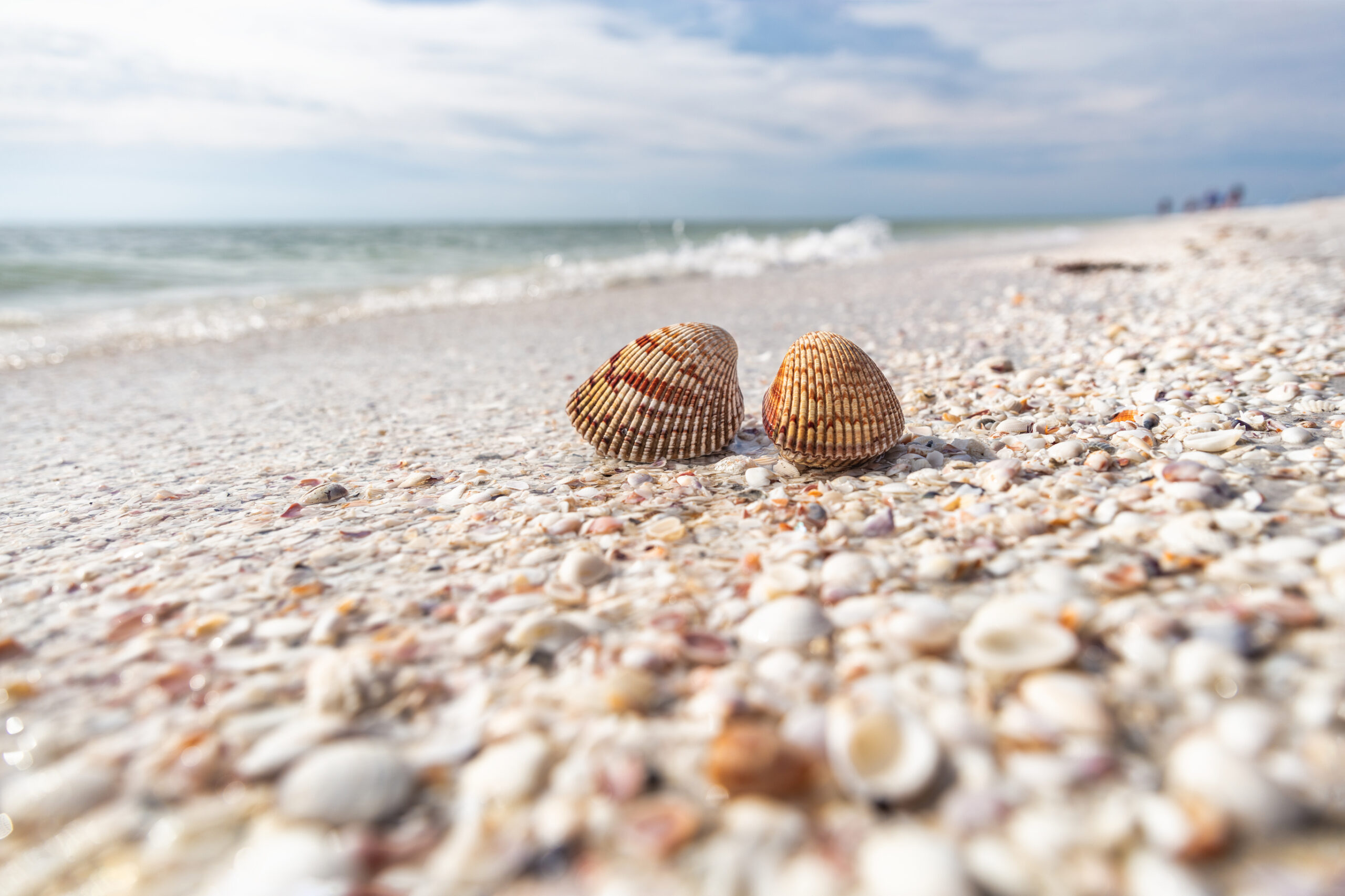Almost all Americans believe they have good beach etiquette, but their actions often contradict their words. According to a new Beach.com survey of over 1,000 American adults, nearly everyone (93%) claims to practice good beach etiquette, yet almost everyone (92%) also admits to at least one bad beach habit.
From pocketing shells to peeing in the ocean, Americans have plenty of room for improvement if they hope to become the model beachgoers they think they are. However, if waiting on a nationwide manners makeover isn’t your thing, check out these must-visit California beach towns that offer more tranquil beach retreats without the crowds. Or, dive into this latest report that takes stock of the confessions, contradictions, and biggest etiquette offenders that expose the gap between our self-perceptions and actual behavior at the beach!
Table of Contents
Key Findings
- Almost all Americans (93%) think they have good beach etiquette, but 92% admit to engaging in at least one bad beach behavior.
- Americans, on average, engage in at least 3 bad beach behaviors.
- The three most shameless beach behaviors Americans engage in are #1 taking sand or shells, #2 peeing in the water, and #3 drinking alcohol.
- The top three beach behaviors Americans find most annoying are #1 littering, #2 not picking up after pets, and #3 sitting too close.
American Beach Etiquette Beliefs
The disconnect between American beach etiquette beliefs and actions is both widespread and routine. For starters, almost every American (96%) believes in the concept of beach etiquette. Nearly everyone (93%) thinks they have good etiquette. However, that doesn’t stop just about everyone (92%) from breaking the unspoken rules.
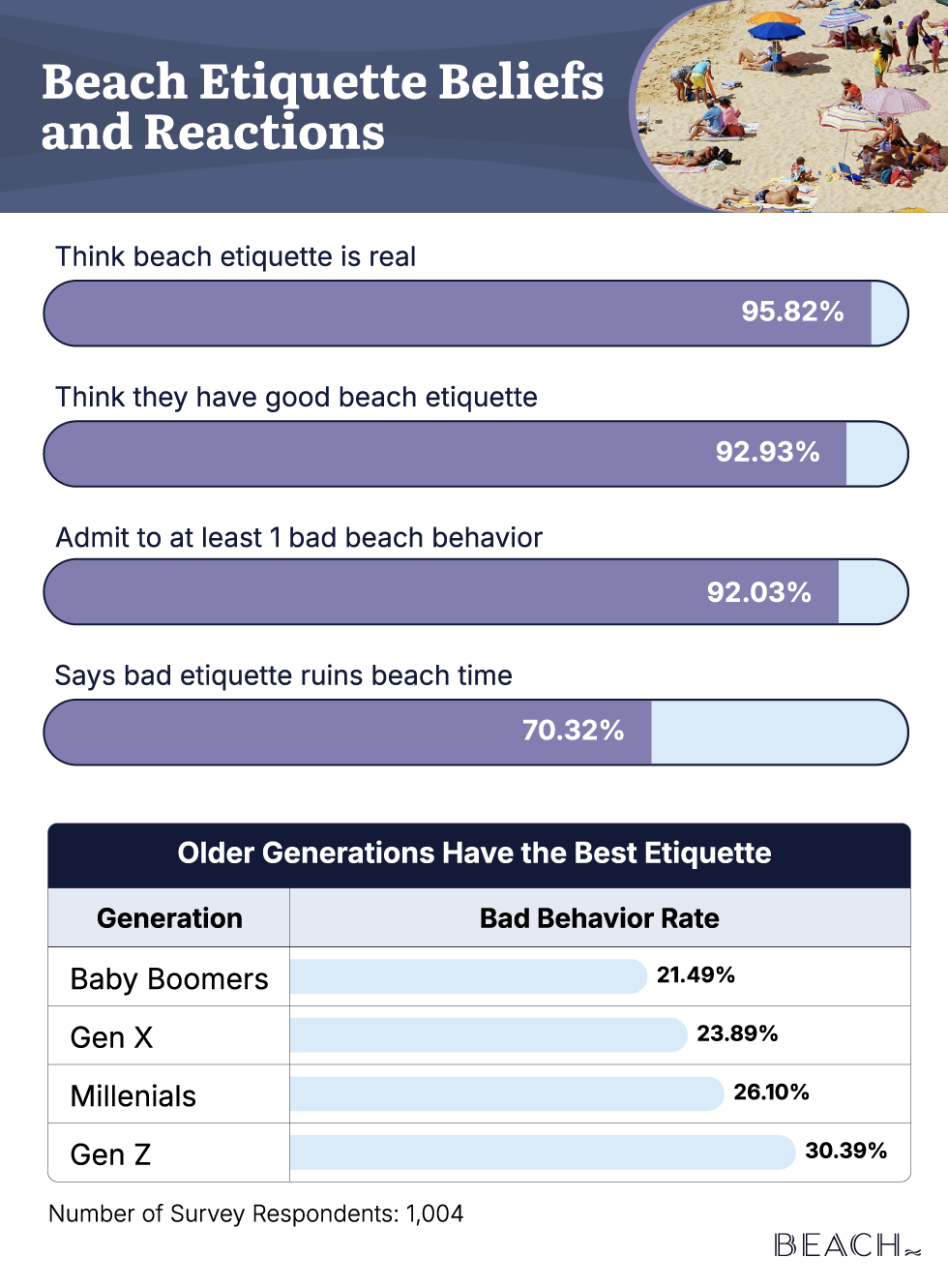
On average, each American engages in three questionable behaviors when they hit the beach. This suggests that poor etiquette is less of a rare misstep and more along the lines of a staple beach behavior. In fact, 19 out of every 20 Americans have witnessed bad beach etiquette.
There’s also a generational gap in beach manners. Older Americans report fewer bad beach behaviors throughout their lives, not just now, but even when looking back to their younger years. In other words, the decline in etiquette isn’t just a phase of youth; it appears each generation is slipping further from the standard.
America’s Naughty Beach Habits
So what are people really up to once the towels are out, sandals off, and nobody’s looking? According to our survey, the most commonly admitted behavior is peeing in the water, of which 70% of the country admits to. Other top confessions include drinking alcohol when banned (49%) and taking sand or shells (38%).
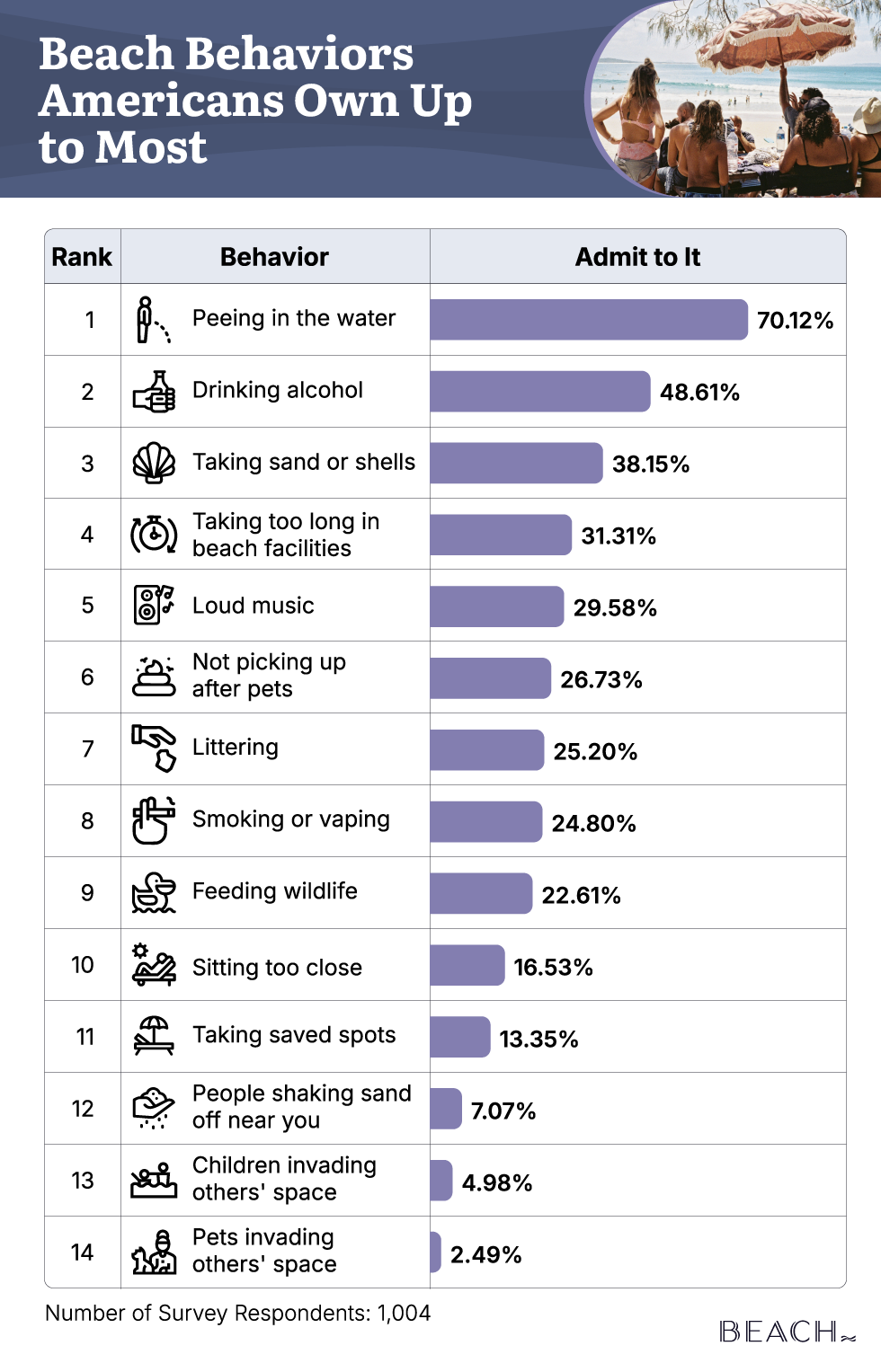
We also found the most shameless behaviors Americans admit to most at the beach. We define shameless as the behaviors that people admit to the most, while not many find it annoying. The idea is that there are objectively undesirable behaviors, even if not many people find them bothersome.
The top three shameless behaviors are also the same ones people admit to the most. Taking sand or shells pans out as the #1 shameless behavior, with 38% admitting to doing it and only 4% finding it annoying. Peeing in the water is the #2 shameless behavior, with 70% admitting to it, yet only 19% finding it annoying. Drinking alcohol when banned is #3 with a 49% confession rate and only 15% disapproving of it.
It’s not always easy to poll for confessions, even though our respondents appeared readily willing. One way to get around that issue is to ask what people think others do. This taps into the false consensus effect, where people believe most others do something because they do it. In other words, we surveyed for unconscious projection. And the results stack up.
The top behaviors most Americans think other people do secretly are, yet again, peeing in the water, drinking alcohol when banned, and taking sand or shells. However, far more people think others are doing these things than they admit to themselves. Over 4 in 5 Americans think most people pee in the water, over two-thirds think most sneak in alcohol when banned, and over two-thirds believe most people take sand or shells from the beach.
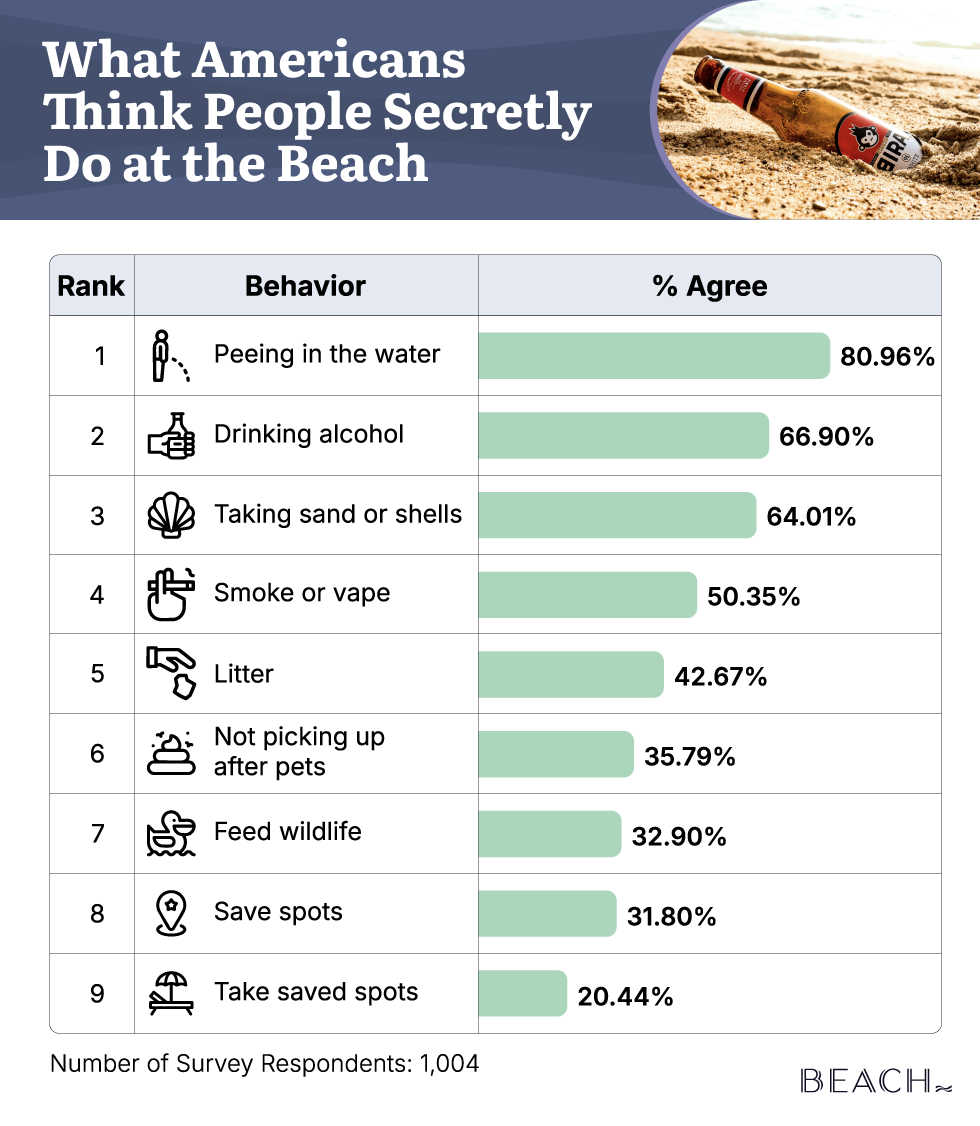
What Annoys Beachgoers Most
Americans quietly admit to their bad beach etiquette, but they’re much more vocal about the bad etiquette of others. We also appear to be a bit hypocritical. Even though 93% of the country thinks they have good beach etiquette, 92% also admit to at least one bad beach behavior. Here is the hypocrisy — a whopping 70% also say poor etiquette negatively impacts their time at the beach.
So, which behaviors are annoying people so much that they can change the tone of a vacation? Respondents put littering as the #1 most annoying behavior at the beach, with 82% finding it irritating. They put not picking up after pets as #2, with 61% selecting. Sitting too close to others comes in at #3, with 54% finding it annoying.
We also asked respondents to select the worst behavior out of a series of paired options. This battle of bad beach behaviors shines more light on the unspoken rules that are best left unbroken. Respondents said littering is more annoying than peeing in the water. This supports our finding that littering is the #1 most annoying behavior, even beating out the idea of someone using the ocean as a toilet.
Even though sitting too close to others pans out as the #3 most annoying habit when we look at the sheer volume of respondents who chose it, in a head-to-head, respondents say that having sand shaken off near you is more annoying than people sitting too close.
Playing loud music pans out as more annoying than smoking or vaping at the beach. Apparently, our ears are more sensitive than our noses and lungs. We also have more tolerance for kids than pets; more people find pets running loose more annoying than kids running loose. Then, to answer the time-old question about saving spots, respondents decidedly say that taking saved spots is more irritating than saving a spot.
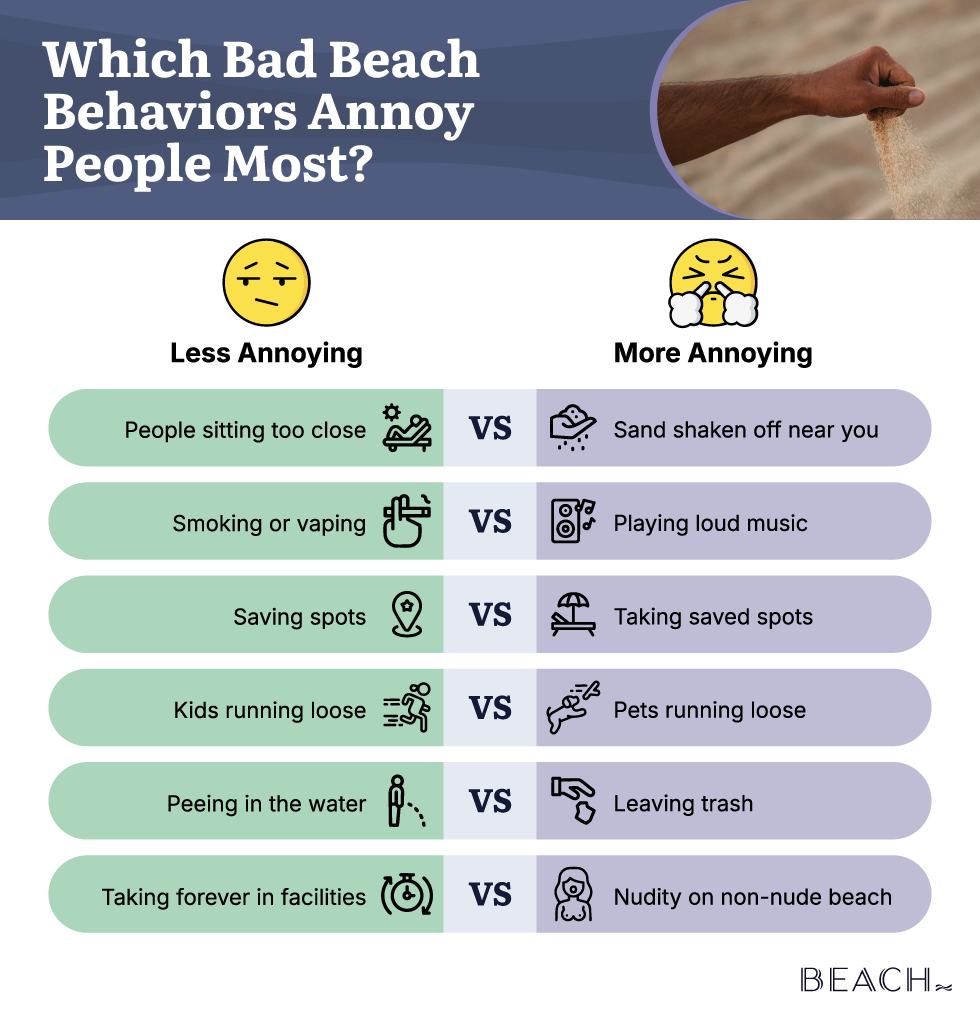
When it comes to how people respond when they witness bad beach behavior, most choose the path of least resistance. The highest share of respondents (32%) said they ignore bad etiquette. The second highest group (26%) will change spots in response. The furthest most seem to go is to give disapproving looks (25%). As far as more confrontational responses go, only 7% say they call people out on bad etiquette, and 6% report them.
Let’s Keep Beaches for Everyone
Who doesn’t love the beach? It’s a chance to unwind, unplug, relax, and have some fun. The appeal is universal. However, it’s essential to be considerate of others enjoying the same sand, sun, and fun. It’s clear that Americans could turn a little more attention to improving their beach etiquette. Whether it’s littering, playing disruptive music, or taking something that isn’t yours, every little misstep can affect the beach experience for others.
At Beach.com, we’re not just here to help you find the best beach experiences of your life; we’re dedicated to making sure the beach is enjoyable for everyone for generations to come. While some self-awareness about your current beach habits goes a long way, you can be part of the solution and help propel a nationwide beach manners makeover. If you’re ready to set a good example for others, join us for a beach cleanup near you. You can make a difference for everyone who enjoys the shores, and together, we’ll maintain a global beach experience that’s enjoyable for everyone!
Sources and Methodology
On March 4, 2025, we surveyed 1,004 Americans who visit the beach at least once a year about the types of behaviors they witness and engage in at the beach. We also asked respondents to report which behaviors they find most annoying, which they think most people engage in discreetly, if they believe in beach etiquette, and if they think they have good beach etiquette. Respondents ranged in age from 18 to 77 years old, with 49.3% female, 49.3% male, 1.1% nonbinary, and 0.3% preferring not to say.
Fair use
When using this data and research, please attribute by linking to this study and citing Beach.com.

